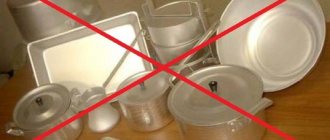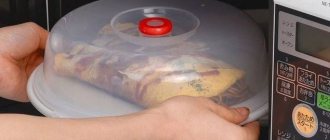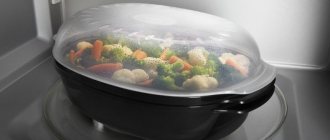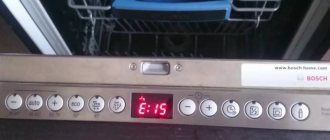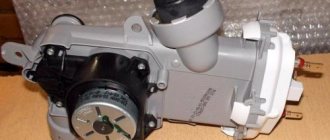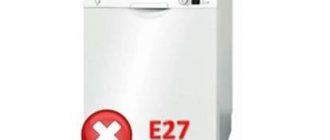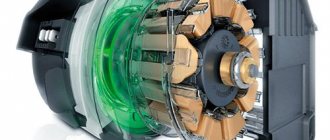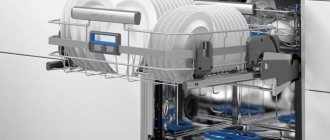Why should you not wash aluminum cookware in the dishwasher?
Home » Why you can’t » Why you can’t wash aluminum dishes in a dishwasher
The dream has come true - the dishwasher is finally installed, you can start washing. Many people have a desire to wash all the dishes that are in the house, and some, without thinking, do so.
However, there is no need to rush, because putting some things in the dishwasher is strictly prohibited. First of all, this applies to all products made of aluminum.
Why exactly aluminum cookware is “afraid” of the dishwasher, let’s figure it out.
Reasons why you should not put aluminum in PMM
Aluminum is a fairly active metal that reacts with many substances and even with water, under certain conditions. Such conditions are created inside the dishwasher.
On the surface of this metal there is a dense oxide film that is easily dissolved by alkalis.
Many dishwasher detergents contain alkalis; thanks to them, dishes are washed without physical impact.
So, under the influence of alkali in hot water, the oxide film is removed from the surface of aluminum cookware. As a result of this, aluminum is able to react with water, which leads to the destruction of the aluminum itself and the appearance of a dark coating on its surface.
If you expose dishes to this effect for a long time, they will not only become dark, but will also begin to deteriorate.
Some note that after washing the dishes at 35 degrees, nothing happened at all, but we warn you again, after several such washes, the dishes will still darken, and possibly forever.
Important! Scientists have proven that aluminum cookware cannot be used. Metal enters the human body in large quantities, negatively affecting the functioning of all organs without exception.
Hand dishwashing detergents are less harsh, so we don't notice any changes with aluminum cookware. However, with prolonged use, the darkening effect still appears. So, let's conclude that aluminum cookware should not be put in the dishwasher because:
- it loses its appearance, acquiring a dark coating;
- it is not safe for health.
What to do with darkened dishes?
It’s clear why it’s forbidden to wash aluminum in the dishwasher. But not many people remember chemistry lessons, not everyone reads the instructions for dishwashers, and not all instructions contain a note that aluminum dishes cannot be washed, and some even accidentally put aluminum products in the tank. On thematic forums, users write about how they were spoiled:
- pots;
- frying pans;
- garlic presses;
- spoons;
- parts from a meat grinder.
Therefore, the question arises: is it possible to restore aluminum cookware to its former shine and attractiveness? Everything is not so simple and will depend on how much the dishes have darkened.
The protective layer of metal is not destroyed immediately; the hotter the water and the more alkali in the detergent, the faster the dishes will darken and become covered with a gray coating.
Of course, the damaged dishes should be thrown away, but sometimes this is not possible, especially if they are parts from a new meat grinder. How then can you remove plaque?
Only manual cleaning with special means will help. But boiling with soda and powder will only aggravate the situation, so under no circumstances do this.
Nitric, sulfuric and other acids can help in the fight against dark gray plaque, but we will not describe this method, since it is not safe and can lead to irreversible consequences.
Acetic and citric acid are unlikely to help, they are weak. Here's what to try:
- cleaning and polishing with GOI paste for final polishing. It is necessary to apply the paste to a piece of felt cloth and rub the darkened product;
- polishing using a special paste made in France by Dialux;
- treat darkened products with HORS rust converter for cars (use as a last resort), and then rub with one of the above mentioned products.
Remember! You should wash aluminum cookware only with your hands and, if possible, with special products, of which there are many on sale, or with ordinary kitchen soap.
Not only aluminum cookware can be damaged in the dishwasher. And if in some cases such dishes can and should be replaced, then you won’t part with another one so easily. Therefore, pay attention to what other products should not be washed in the dishwasher:
- dishes made of wood or with wooden parts - such dishes will swell and crack if left in water for a long time;
- silver and cupronickel tableware - just like aluminum tableware, it can darken and lose its attractive appearance, which is not so easy to return;
- frying pans with Teflon coating, if there is no permission sign - during the washing process, unprotected Teflon becomes matte, which leads to food burning;
- knives – under the influence of hot water, knives become very dull;
- bone and expensive porcelain can darken and lose shine.
The most important thing when washing dishes is to observe the temperature regime and the rules for arranging dishes. You can even ruin ordinary dishes if you wash them in too hot water with concentrated detergent.
So, aluminum cookware is prohibition number 1 for the dishwasher. If you don’t want to ruin the parts of your new meat grinder or your favorite aluminum frying pan, then don’t experiment based on the advice of other users, they say, until you try it yourself, you won’t know. In this case, everything is quite clear even without experiments; learn from the mistakes of others.
- Share your opinion - leave a comment
Good publicity
mashmaster.ru
When we buy a dishwasher, we hope that from now on we will be forever freed from this tedious housework.
Therefore, after reading the instructions, we begin to ask ourselves a question, for example: why can’t we wash aluminum cookware in the dishwasher? This is easily explained: ordinary aluminum cookware, which we inherited from our mothers and grandmothers, is easily oxidized by alkalis and oxidizing agents contained in detergents, so sooner or later we may find through holes in it. As for more modern anodized aluminum cookware, under the influence of the same reagents it loses its shine and becomes cloudy.
In general, the list of items that cannot be washed in a dishwasher does not end with aluminum. The instructions for the PMM must contain a list of products that should not be washed in it, so we will consider only general cases: what and why cannot be washed in the dishwasher, and what can be washed, but with some restrictions.
It is strictly forbidden to wash wooden utensils or some utensils made of wood in the dishwasher, as under the influence of moisture and high temperatures it can change color, crack and swell. Bone decor will probably suffer the same fate. Mother-of-pearl inserts may become thin, lose color, and crack. Devices made of brass, tin, copper and silver will share the fate of their aluminum counterparts.
It is also not advisable to wash silver in the dishwasher, otherwise it may become stained or dull. If you still decide to do this, then you should follow several rules. It is imperative to remove all food debris from it, especially salty, sour or spicy foods, as well as eggs.
You shouldn’t mix silver cutlery with steel cutlery either, it will definitely darken. You need to make sure that as little detergent as possible gets on the silver.
The washing should be started immediately after the basket of silverware has entered the PMM, in order to prevent the oxidation process from starting, and the cutlery should be removed as quickly as possible after the process is completed and wiped dry.
Cookware made of cast iron and regular steel will also be subject to corrosion. If you do wash it in the machine, you should take it out immediately after the end of the cycle and wipe it dry.
How to fix the situation?
If an incident has already occurred, this does not always mean that the dishes will certainly have to be thrown away. First, you need to soberly assess the “scale of the disaster.” In many cases, damaged dishes can be helped by preparing them for further use and returning them to their original shine.
We recommend: How to crack ampoules for injections without a file one or two times...
If the washing took place at a not very high temperature and with a small amount of detergent, the damage will most likely be repairable. And vice versa: the higher the temperature and the more detergent, the more difficult it will be to correct the situation (and sometimes it is completely impossible).
So, first you can try a gentle method: wash the affected item first with a strong vinegar solution, and then with a soda solution. If this does not help, you will have to resort to using special household chemicals.
Don’t follow your grandmother’s “good old and tried-and-true” recipe, which calls for boiling aluminum pots or pans with laundry detergent and soda to brighten. This way you will only ruin everything completely.
How can you treat darkened aluminum? There are several remedies that make sense to try:
- GOI. This paste must be applied to a piece of felt and polished on the aluminum surface.
- Dialux. This is also a polishing paste that can cope with blackening of soft metal.
- HORSE. This is an automotive rust control product that can be called “heavy artillery.” That is, it is worth resorting to his help when previous methods did not produce results. You should first treat the damaged product with HORS, and then polish it with any of the above pastes.
Eight items that should not be washed in the dishwasher
Not everyone is excited about washing dishes. Some people simply don’t like the process itself, while others have to wash the dishes for the whole family. Often in such cases, a dishwasher is purchased, which makes life much easier.
However, a dishwasher cannot be the only solution for dirty dishes in the kitchen. The fact is that there is a whole list of items that cannot be put inside. At the same time, sometimes you shouldn’t trust the labels that manufacturers put on.
Here are eight items that should never go in the dishwasher:
Vintage dishes
These days, antique dishes handed down from grandma can be worth a fortune, so you should take care of these sets, even if there are no sentimental reasons for doing so.
Strong detergents and very hot water can damage the finish and hand-painted porcelain and glass. Therefore, such dishes cannot be washed in the dishwasher.
Aluminum cookware
If you want to keep your aluminum pans and pots looking like new, stop putting them in the dishwasher. They will discolor when in contact with detergent that contains a lot of alkali.
Wooden boards and utensils
The chemicals and heat of the dishwasher will eventually turn your wooden cutting boards and utensils into something warped. They may lose their shape and smooth finish. Carolyn Forte, director of the cleaning laboratory at the Institute of Home Economics, suggests making a safer cleaning mixture from sand and water.
Jars with labels
For your own sake, always remove labels from jars and other containers before putting them in the dishwasher. If you do not remove them, a piece of paper may get caught in the filter and heat coils. This can lead to expensive equipment repairs.
Professional knives
If your dishwasher does not have a separate rack for knives, you should not wash them in it. Not only will this destroy the sharp edge, but the handle may also suffer. You may also cause serious damage to the inside of the machine.
“The heat and humidity in a dishwasher can seriously damage both the steel and the handle,” says Josh Moses, co-founder of Misen. This is especially important for carbon steel knives or items with a wooden handle.
He added: “The water jets in the dishwasher can push the knife out and cause damage to surrounding items. In addition, the cutting edge will also suffer.”
Cast iron cookware
Cast iron cookware is ideal for cooking, but it also requires care. A dishwasher can damage the cast iron finish.
The best way to clean a cast iron skillet is to rinse it with warm water and scrub it gently with salt to protect the base.
Travel mugs
Keep travel mugs out of the dishwasher if you still want to use them. The dishwasher breaks down the insulating materials, causing the liquid to lose temperature faster.
Copper utensils
Like cast iron and aluminum, copper can be damaged when washed in the dishwasher. This is true for different types of copper.
How to wash aluminum cookware?
So, if there is a sign on a pot, pan or duck pot that prohibits machine washing, you will have to do it manually. It's actually not that difficult. The main thing is to avoid abrasives, metal brushes or scourers, high temperatures and alkaline detergents. That is, you should wash it with warm water, using only a soft sponge and a liquid non-alkaline detergent (or, in extreme cases, ordinary kitchen soap).
The main problem with darkening of aluminum cookware is the destruction of the protective oxide layer, which is why aluminum and its impurities can get into the food. Therefore, you should wash products made of this metal very carefully. If there is even the slightest doubt about whether a particular saucepan or cauldron will withstand machine “execution,” it is better to wash it by hand.
We recommend: Lush baked goods without yeast: how can you replace yeast in dough
What dishes should not be washed in the dishwasher?
A dishwasher is an ideal assistant in every housewife’s kitchen. It is especially helpful on holidays, when there are a lot of dirty dishes left after cooking and entertaining guests.
But, unfortunately, it will not be possible to completely avoid washing by hand. There are things that are better to wash yourself to preserve their appearance and not shorten their service life.
So, ten items that don't belong in the dishwasher.
Wooden utensils and boards
A long stay in hot water will not benefit wooden utensils; the wood will warp or crack. And dry air during drying destroys the structure of the wood. Therefore, it is better to wash wood products by hand.
Grandmother's porcelain
If you value your grandmother's family set, under no circumstances should you wash it in the dishwasher. Gilding and hand-painting on porcelain will not withstand the high water pressure in the machine.
Thermal mugs
Thermal mugs with a stainless steel flask can be washed in the dishwasher. But mugs with a glass bulb or with foam insulation between the walls will collect water between the walls if they are washed in the dishwasher. As a result, a musty smell will appear and a possible loss of thermal insulation properties.
Garlic presses and graters
It is better to wash these kitchen aids by hand with a brush; the machine will not be able to clean small holes, and dried food remains will remain on them.
Crystal glassware
Crystal dishes can crack if the water is too hot or due to temperature changes. Also, hard food particles lead to scratches. It is better to wash crystal in cool water by hand.
Jars with labels
The jar label can cause damage to your dishwasher. If scraps of paper with glue clog the filter of the machine, only calling a repairman can help you. Therefore, if you want to keep the jar you like, wash off the label on it by hand.
Kitchen knives
Knives can be washed in the dishwasher if there is a special rack for washing knives. Otherwise, you risk not only damaging the machine, but also ruining the knives. After all, it is harmful for knives to remain in hot water for a long time; this causes the blades to become dull.
Copper and aluminum cookware
Don't put copper cookware in the dishwasher if you don't want it to tarnish or stain. Aluminum cookware is easily oxidized by alkalis and oxidizing agents contained in detergents; over time, holes can form in it.
Enamel and glassware with burnt food residue
The dishwasher cannot handle such heavy contamination, so soak the burnt in water and detergent for a couple of hours and rub with a soft sponge.
Plastic dishes
Plastic utensils can be washed in the dishwasher if they have the appropriate symbol on them. Otherwise, deformation of the plastic due to too high temperatures and discoloration due to foreign impurities in the water are possible; this could be simple rust or food debris that will stain the dishes.
Source: https://comode.kz/post/domashnjaja-rabota/kakuju-posudu-nelzja-myt-v-posudomoechnoj-mashine/
Aluminum in the dishwasher
In order not to create intrigue, we will answer this question, namely, can you wash aluminum cookware in the dishwasher? No, such material cannot be put in the PMM, unless of course you don’t feel sorry for your dishes. Aluminum is an active material that instantly enters into a chemical reaction with water or in a certain environment. But the car has all this: chemicals, water and the wash cycle itself. Aluminum cookware has a special protective oxide film that can be destroyed by alkali. The dishwasher uses alkaline detergents, which perfectly wash dishes without physical impact. Let's get closer to the point, what exactly will happen to aluminum cookware after the dishwasher:
- a dark coating appears on objects of such material;
- over time, such pollution will become persistent and cannot be removed;
- the material may completely collapse.
Many of course tried to wash aluminum in the dishwasher and set it to 30 degrees. Yes, perhaps nothing happened to their dishes, but this was a one-time occurrence. Remember, aluminum in PMM is taboo. In addition to the fact that dishes will lose their appearance over time, oxidized aluminum is very harmful to health.
What dishes can be washed in the dishwasher? Online store for tableware
High-quality, high-tech, environmentally friendly tableware
Nowadays, many housewives prefer to use such an indispensable assistant in the modern kitchen as a dishwasher for washing dishes. A dishwasher simplifies life so much that sometimes it’s difficult to imagine our kitchen without it and how we could previously manage without this convenience.
However, it is not always clear which dishes can be loaded into an automatic wash, and which ones are still better to put in order manually.
What are the main dangers for dishes in the dishwasher?
- long (compared to manual washing) exposure to water;
- heat;
- aggressive detergents;
- dry heat at a sufficiently high temperature during the drying process
Thus, based on this, it immediately becomes clear that wood products should not be washed in the dishwasher. Wooden dishes can delaminate and lose not only their appearance, but even completely fall apart.
This is especially true for wooden cutting boards, which are usually made of wooden layers joined together with glue.
However, some cutting boards are now coated with a water-repellent layer during manufacture, making them dishwasher safe. An example is the AquaResist series from Tescoma.
It is not advisable to place antique dishes, silverware, pewter and copperware in the dishwasher as they may darken or become stained. For the same reason, it is not recommended to machine wash aluminum lids and pans.
Do not wash disposable plastic tableware in dishwashers, as they will instantly deteriorate when exposed to high temperatures. In addition, you cannot wash dishes made of crystal, lead, as well as porcelain and earthenware on which the design is applied - it may fade or simply wash off.
Also, uncoated cast iron cookware should not be washed in the dishwasher.
This is due to the fact that cast iron quickly rusts from excess moisture, and also under prolonged exposure to detergent, the natural non-stick layer formed on the surface of the cookware will be washed off.
If it is fundamentally important for you not to wash cast iron cookware by hand, then opt for cast iron with an enamel coating or some type of non-stick. For example, Frybest has a series of cast iron cookware with Fonte ceramic coating.
Can be washed in the dishwasher:
- stainless steel utensils. However, if you do this very often, there is a high probability that the non-stick layer will be damaged, which will lead to subsequent sticking and burning of food during the cooking process;
- utensils with titanium coating using gentle detergents and medium washing temperatures;
- aluminum cookware with a coating, thanks to which it will not darken;
- porcelain and earthenware dishes without designs and gilding (the designs may fade and the gilding may wear off);
- glassware. But in the case of it, it is necessary to observe some precautions, namely: make sure that glassware is not placed close to each other and does not break under the influence of vibrations while the dishwasher is running. For thin glass, you can use the delicate washing mode, as well as special fixing compartments;
- plastic dishes (heat-resistant plastic). You should remember that plastic products are lightweight, which requires them to be securely fixed in the dishwasher;
- Cutlery made of stainless steel and cupronickel (without glued decorative parts).
- Cookware made of heat-resistant silicone: baking dishes, lids with silicone rims, spatulas, spoons, mats and other kitchen accessories.
In addition, it is useful to list some brands whose manufacturers mark their cookware to show us that it is dishwasher safe. Among them:
All-Clad (be careful with those products that have copper inserts - they may darken), Anolon, Calphalon, KitchenAid, Le Creuset, Pyrex (all glassware can be washed in the dishwasher), Moneta, Frybest, TVS, Stoneline, Alluflon, Ballarini, Vinzer, Vitesse and others.
However, it must be remembered that most manufacturers, indicating the possibility of washing dishes with a ceramic coating or a conventional non-stick coating in the dishwasher, indicate in the instructions the conditions under which this is possible. Most often, the use of a delicate regime and gentle detergents is required. Read the instructions carefully before use! First of all, pay attention to the manufacturer's labeling.
By following all these little tricks, we will significantly contribute to ensuring that our dishes serve us for a long time and at the same time maintain an excellent appearance.
We also recommend that you read:
What dishes should not be washed in the dishwasher - educational program for housewives
Why are some dishes safe to put in the dishwasher, while others are best cleaned by hand? The whole problem is that certain conditions are created inside this dishwashing technique that affect the material from which the plates or pans are made.
Such conditions include:
- high temperature;
- various chemical components;
- prolonged contact with water;
- very hot air.
Modern dishes are made from a wide variety of materials - iron, cast iron, ceramics, porcelain, and each of these materials can react differently to washing in the dishwasher. There are things that will quickly deteriorate from such cleaning. This is why it is so important to know what can and cannot be washed in the dishwasher. Let's figure it out together.
Before you start using the washing machine, carefully read what dishes cannot be washed in it. This will help you avoid damaging expensive items by doing the wrong thing.
Aluminum cookware
This is the number one item that should never be put in the dishwasher. Aluminum is a metal that reacts with many substances, including water under certain conditions.
Thus, under the influence of high temperature and upon contact with various detergents, aluminum cookware begins to quickly darken.
Therefore, there is no need to clean spoons, forks, plates and pots made of aluminum in the machine - it is better to remove all dirt with a sponge.
Aluminum cookware
Wooden crafts
Rolling pins, spoons, cutting boards... What housewives don’t put in dishwashers, and then they are surprised at the completely ruined things.
But the explanation is very simple: wood, as a result of prolonged contact with water, begins to quickly swell, which is why the product itself from this material increases in size.
After the dishes dry, the wood fibers shrink and the bond between them is broken. What happens as a result?
A wooden spoon or board becomes deformed and loses its original appearance - all that remains is to simply throw away the dishes, since they cannot be restored. In this case, the process of swelling of the material occurs in literally half an hour even in cold water; in hot water this process accelerates several times.
Wooden utensils
Plastic dishes
But with plastic, not everything is so simple - under some conditions it can still be washed in a car. But only if the dishes are made of heat-resistant plastic. But we strictly do not recommend trying to wash the following items in dishes:
- disposable products (forks, knives, cups);
- plates without identification marks;
- plastic toys that smell strongly of chemicals;
- dishes with glued elements.
Disposable tablewarePlastic tableware without identification marksPlastic toys that smell strongly of chemicals
But not only the above products should not be washed with a machine. Let's look at the list of items that are also not recommended for such automatic cleaning:
- Products made from fine porcelain, as this material can quickly crack when exposed to hot temperatures.
- After several washes, cast iron cookware will begin to become covered with rust, which will be very difficult to remove.
- Can crystal items be washed in the dishwasher? There is no definite answer here, since crystal also comes in different forms. However, we can say with confidence that it is definitely not recommended to wash thin crystal in this way, since microcracks may appear on objects due to high temperature.
- Dishes with vacuum lids. The thing is that hot air and water can deform such products, as a result of which the dishes will lose their tightness.
- Sharp kitchen knives should also not be placed inside equipment. This recommendation should be followed in order to avoid sharpening your knives every week, since the knives will remain sharp only if they are washed under cold water. So, after holding the blade under running hot water for 5–7 minutes, there is a high chance that its sharpening will become much worse. The same rule applies to any other sharp objects.
- Also, you should not clean copper objects in this way, since copper quickly begins to darken as a result of contact with hot water and detergents.
PorcelainCast Iron CookwareCrystal Vacuum Lid CookwareSharp Kitchen KnivesCopper Items
Some restrictions also apply to thermal mugs or thermoses. Carefully study the manufacturer's recommendations, since some products are dishwasher safe, but not all. If there is no such information on the label, it is better to clean the dishes by hand.
By the way, this technique hides some secrets, since it can be used to wash not only dishes, but also some other objects and things. Let's take a closer look at when a dishwasher can come to the rescue.
Kitchen hood filter
In order for the kitchen hood to perform its duties 100%, it is advisable to wash and clean it regularly. But what if serious grease stains still form on it? In this case, use a dishwasher, which, thanks to high temperatures and detergents, can easily cope with even complex stains.
Kitchen hood filter
Plastic toys
Sturdy toys made of high-quality plastic are completely washable. The main thing is to check that there are no batteries or electronic components inside the products - water will simply ruin the toy.
Soap dishes and brush holders
Washing such items is quite difficult and not very convenient. But doing this in a dishwasher is simple and easy, especially since the detergent and powerful pressure of hot water will quickly remove the oldest stains.
Makeup brushes and combs These items can also be placed inside the machine and cleaned. However, if you decide to wash your combs this way, remove all the hairs from them so that the filter of your household appliances does not become clogged.
Plastic toysSoap dishesPlafonds
